

A review of rubric use in higher education - Assessment & Evaluation in Higher Education - Volume 35, Issue 4. This paper critically reviews the empirical research on the use of rubrics at the post‐secondary level, identifies gaps in the literature and proposes areas in need of research.
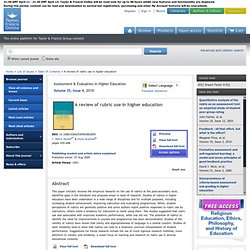
Studies of rubrics in higher education have been undertaken in a wide range of disciplines and for multiple purposes, including increasing student achievement, improving instruction and evaluating programmes. While, student perceptions of rubrics are generally positive and some authors report positive responses to rubric use by instructors, others noted a tendency for instructors to resist using them. Two studies suggested that rubric use was associated with improved academic performance, while one did not. The potential of rubrics to identify the need for improvements in courses and programmes has been demonstrated. Studies of the validity of rubrics have shown that clarity and appropriateness of language is a central concern. Keywords Related articles View all related articles. Grille d’évaluation. J’ai déjà parlé sur ce blog de grilles d’évaluation critériées (ou rubrics) et d’autres sujets liés à l’évaluation des apprentissages.
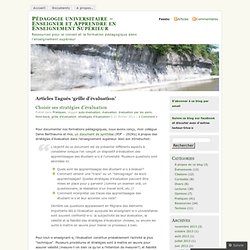
J’ai rassemblé aussi quelques ressources sur le sujet sur cette page avec des exemples de grilles. Lors du module de formation que nous donnons à Lausanne sur les stratégies d’évaluation, plusieurs questions sont souvent posées par les participant-e-s: est-il possible d’être vraiment objectif-ve quand on évalue les apprentissages des étudiant-e-s? Ne vaut-il pas même mieux être un peu subjectif-ve quand même? L’idéal, ce serait de pouvoir évaluer toujours de la même façon, sans être influencé-e par exemple par le soin de l’écriture d’un-e étudiant-e ou par sa tenue vestimentaire. Ces questions touchent à la pratique quotidienne de l’évaluation et ne sont pas du tout anodines.
Une façon de diminuer la subjectivité de l’évaluation (sans nécessairement l’écarter totalement) est d’utiliser des grilles d’évaluation critériées. Read Full Post » Formeval.pdf (Objet application/pdf) Guide_Evaluation. Does assessment for learning make a difference? The development of a questionnaire to explore the student response - Assessment & Evaluation in Higher Education - Volume 36, Issue 7. Assessment for learning is a widely used term and the concept forms the basis of many teaching innovations in higher education.
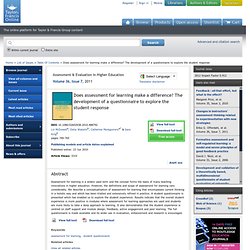
However, the definitions and scope of assessment for learning vary considerably. We describe a conceptualisation of assessment for learning that encompasses current thinking in a holistic way and which has been trialled and extensively refined in practice. A student questionnaire is presented which has enabled us to explore the student experience. Results indicate that the overall student experience is more positive in modules where assessment for learning approaches are used and students are more likely to take a deep approach to learning. It also demonstrates that the student experience is centred on staff support and module design, feedback, active engagement and peer learning. Keywords Related articles View all related articles. Index. Evaluation_des_apprentissages_dans_les_nouveaux_programmes.pdf (Objet application/pdf)
Courageous Conversation: Formative Assessment and Grading. With all the education action around Standards-Based Instruction, Understanding By Design, Assessment for Learning, Grading for Learning, Project-Based Learning, Competency-Based Instruction and more, we need to have a frank conversation about formative assessment and grading.
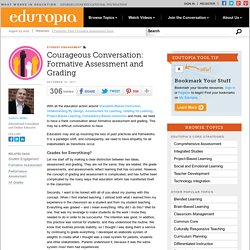
This may be a difficult conversation to have. Educators may end up mourning the loss of past practices and frameworks. It is a paradigm shift, and consequently, we need to have empathy for all stakeholders as transitions occur. Grades for Everything? Let me start off by making a clear distinction between two ideas, assessment and grading.
Secondly, I want to be honest with all of you about my journey with this concept. So what was the problem? Instead, I was clouding the issue of instruction with grading. Changing the Conversation What has changed? Why don't I grade formative assessment? The Payoff A couple of important notes: I do use formative assessment in two ways. Donald kirkpatrick's learning evaluation theory - a training and learning measurement, evaluations and assessments model. Donald L Kirkpatrick's training evaluation model - the four levels of learning evaluation also below - HRD performance evaluation guide Donald L Kirkpatrick, Professor Emeritus, University Of Wisconsin (where he achieved his BBA, MBA and PhD), first published his ideas in 1959, in a series of articles in the Journal of American Society of Training Directors.
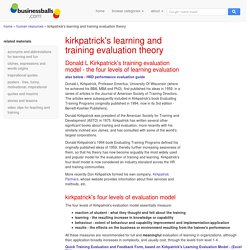
The articles were subsequently included in Kirkpatrick's book Evaluating Training Programs (originally published in 1994; now in its 3rd edition - Berrett-Koehler Publishers). Donald Kirkpatrick was president of the American Society for Training and Development (ASTD) in 1975. Kirkpatrick has written several other significant books about training and evaluation, more recently with his similarly inclined son James, and has consulted with some of the world's largest corporations.
More recently Don Kirkpatrick formed his own company, Kirkpatrick Partners, whose website provides information about their services and methods, etc. see also.